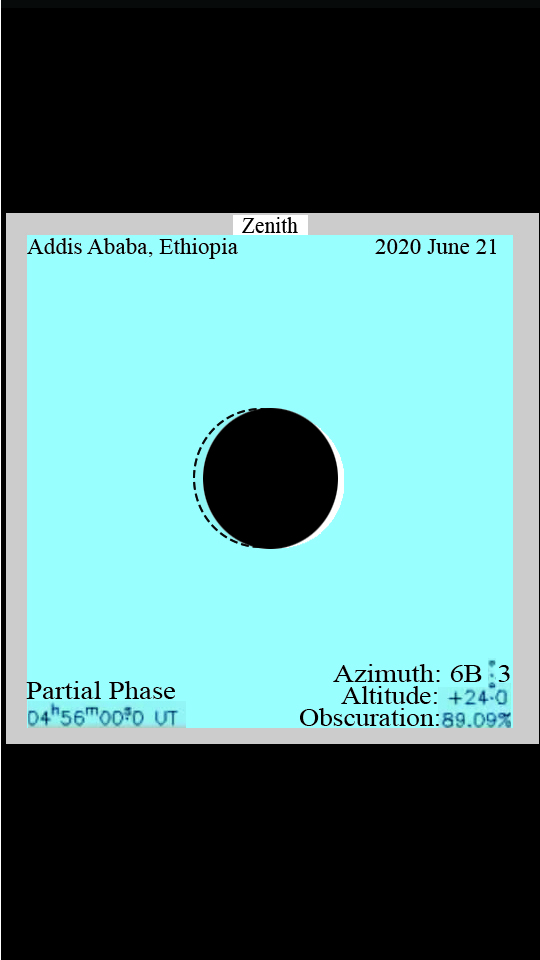
- To see full eclipse takes century
ADDIS ABABA – Ethiopian space science experts said that due to coronavirus, the country has lost income expectation from eclipse chasers who visit atmosphere of the sun have canceled trip to Ethiopia.
In an exclusive interview with The Ethiopian Herald Astrophysist Getinet Feleke(PhD) said that the global pandemic which named after one of the atmospheres of the sun [corona] has halted international astrophysists’ trip to witness annular eclipse from Ethiopia.
As to him, over 500 researchers had been registered to come to Ethiopia in a bid to witness the precious natural event that will take place this June. They had planned to conduct astronomic study from Lalibelaand visit tourist attractions simultaneously. However, they are almost unable to do so as the pandemic has restricted people’s movement across the world, he noted.
“There is narrow opportunity to the researchers to come to Ethiopia as the event is left with just 29 days.”
Whatsoever, Ethiopian researchers will move to various places in the country to undertake study and inform the public about the eclipse, he stated.
An eclipse happens two or three times each year when the moon casts a shadow over earth appearing between earth and sun so that it halts the ray of the sun and release quarter, semi or none of the light, Ethiopian Space Science Society Deputy Head Sisay Fentahun said.
“However, the shadow might not get us because the moon orbits earth on five degree from the equator and also its eclipse nature casts the shadow outside of the earth.” Sometimes, the shadow might appear on earth which induces total or full eclipse in a specified area, he noted. And it takes a century to happen such a full eclipse in one place, he noted.
Such eclipse helps to conduct more research on the sun using technologies and filtering glasses since it paves the way for starring at the sun than any other times, he expressed.
The situation is suitable to study substances of the sun, its atmospheres including corona. It is also significant to attract more tourists as the situation is closely monitored by eclipse chasers who plan traveling to the eclipse appearing place even before ten years, he noted.
Ethiopian researchers will get an important opportunity to conduct their study related to sun atmospheres like photosphere, chromospheres and corona, According to Getinet.
The eclipse also helps to study the sizes of sun and moon and weather variation and impact in such situation and modality of space after the eclipse, he elaborated.
The eclipse that will be occurred this June mainly covers Africa, Asia, and the Pacific. But in Ethiopia, the annular eclipse lays in Bombasi, Mendi, in Beninshangul Gumuz state whereas the sun might be shadowed near to 100 percent, Sisay mentioned.
He further stated that some areas like Injibara, Nifas Mewcha, Lalibela and Alamata in Amhara and some parts of Tigray, Afar states also will be facing annular eclipse. The sunlight will be covered between 94, 90, and 80 percent respectively in Bahir Dar, Mekelle, and Addis Ababa cities too.
“However, the eclipse will not halt daily movement because at least two or three percent of the sunlight will flash out.”
As to him, the public ought to use filter glasses or other materials to observe the eclipse to since it cause sight damage for naked eye.
People usually use floppy disks to look at the sun which is not advisable, Sisay said, adding that his association will inform the public about recommendable materials to witness the eclipse cautiously.
“The sun will be covered for hours which harm our eye due to darkness and harsh light break out from the moon’s shadow.”
The major problem is the people will look at the sun when it gets shadowed as it is odd and inspiring. However, many lost their sight for directly watching at the sun with naked eye during an eclipse over the past times, said Dr. Getinet recommending the proper use of eclipse glasses.
It was on May 7, 2020 that the Ethiopian Space Science and Technology Institute announced annular eclipse will happen in Ethiopia in 21st of this June lasting for six hours.
The Ethiopian Herald May 19/2020
BY YOHANES JEMANEH



